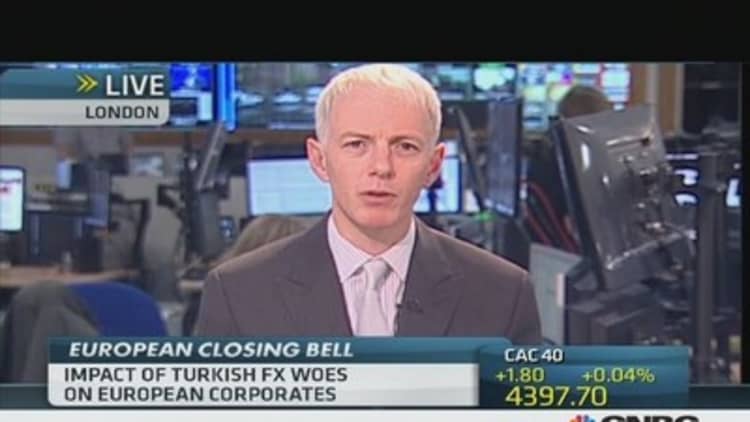
As the turmoil in Ukraine continues, analysts have flagged Turkey as another country to watch, given its vulnerability to both capital outflows and energy disruption, should the situation in Ukraine worsen.
Ukraine topped a list of emerging markets highly vulnerable to shifting capital outflows published by Standard & Poor's (S&P) on Wednesday — but emerging Europe neighbor Turkey also featured high in the rankings.
In its report on emerging markets (EMs), S&P ranked Turkey as the third-most susceptible country to capital outflows, due to its high external financing needs, external debt levels and deficit. It came in just behind Ukraine — currently the focus of a West-versus-Russia showdown — and frontier market Ghana.
"Inevitably, these pressures raise questions about the impact on sovereign ratings," wrote Moritz Kraemer in the S&P report on emerging markets.
"The key risks for many for our ratings on emerging markets sovereigns are, in our view, not tapering and its effects, but domestic policy choices and implementation."
(Read more: Ukraine enlists billionaires to take on Russia)
S&P held Turkey's credit rating at BB-plus in February but downgraded its outlook to "negative" from "stable," citing the risk of an economic hard landing. Also in February, S&P cut Ukraine's credit rating to CCC and warned it was at risk of defaulting on its sovereign debt.
Capital inflows into emerging markets retrenched over the summer of 2013, after the U.S. Federal Reserve signaled the start of bond purchase tapering by year-end. These markets were also hit in early 2014 as investors became more risk-adverse, in part due to continuing weak data out of emerging-market lynchpin China.
In the first two months of this year, there were net outflows of $30.2 billion from emerging market equity funds and $12.9 billion from emerging market bonds funds, according to fund tracker EPFR.
Kraemer judged that Turkey was particularly vulnerable to the outflows, due to its high external financing needs worth 139 percent of GDP (gross domestic product) and external short-term debt at 166 percent of GDP.
"The results indicate that the popular moniker of the so-called 'fragile five' (Turkey, South Africa, Indonesia, India and Brazil) actually masks significant differences between these emerging economies," he said.
"While Turkey and South Africa do appear in the top 10 of vulnerable economies, Brazil is actually in the bottom one (mostly thanks to its low stock of short-term external debt), while India and Indonesia occupy the middle-ground."
(Read more: Venezuela's not in danger yet: Pro)
Another concern for international investors in Turkey is the aggressive interest rate hikes — in January the central bank raised its overnight lending rate from 7.75 percent to 12 percent. The hikes were aimed at supporting the lira, which has fallen around 24 percent against the U.S. dollar since the beginning of 2013.
"While the Turkish central bank's panicky rate hikes on January 28 now seem like a distant memory, they ended up raising more question than answers, at a time when Turkey's economy is slowing sharply ahead of crucial local election on March 30," said Nick Spiro of Spiro Sovereign Strategy in a research note on Wednesday.
(Read more: Could South Africa be the next to hike rates?)
Phoenix Kalen, a strategist at Societe Generale, added that Turkey was also vulnerable to the energy supply disruption which could result if the West levied sanctions against Russia for its actions in Ukraine.
"Turkey has high energy vulnerability," Kalen said in a note on Wednesday. "Relative to developed markets, EM countries in EMEA (Europe, the Middle East and Africa) are more reliant on Russian natural gas imports, have stronger trade linkages to Russia and Ukraine, and face steeper increases in import costs from higher oil prices."
(Read more: )
"These dependencies are likely to translate into higher asset price deterioration and volatility for EM countries relative to their developed markets counterparts, should tensions rise between Russia and the West," he added.
—By CNBC's Katy Barnato. Follow her on Twitter: @KatyBarnato

